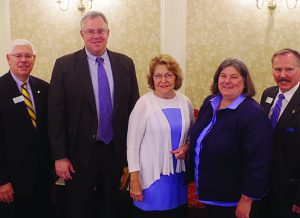
BY ANDREA PALMER
State representatives discussed a variety
of issues facing the State Legislature that
impact the region at the “Eggs & Issues”
breakfast forum hosted by the Adirondack
Regional Chamber of Commerce on June 12
at the Queensbury Hotel.
Sen. Betty Little, Assemblyman Dan Stec
and Assemblywoman Carrie Woerner were the
featured speakers.
Woerner, who finished her first year in the
Assembly, said “it’s exciting to be part of an organization
that is rebuilding itself. Any change of leadership under any circumstance is an
opportunity to re-look at how we do business.
The new speaker has been very good and has
opened up the opportunity for less-tenured
members to participate in the legislative
process. In the coming year, we will see a lot
of new policies implemented. The Legislature
is reconstructing itself. It’s an exciting time.”
Woerner cited the Education Tax Credit as
a major challenge.
“Frankly, the Education Tax Credit is a giveaway
to New York City. It’s been a very divisive
issue regarding how to properly fund education
at all levels,” she said. “We were fortunate to
get more public money for public schools, but
our schools and community colleges are still
not properly funded–yet here we are arguing
that we should give away $160 million to
parochial education in New York City.”
Little stated that she supported the Education
Tax Credit.
Dan Stec addressed a Pension Forfeiture
Bill he is involved with. “If you are a corrupt
official [convicted of a crime related to the
position], you should forfeit your public pension.
If you take a poll, more than 80 percent
of Upstate New Yorkers support this bill. Yet
it’s been a stumbling block in the senate in
regards to ethics reform,” said Stec.
“A third of the members of the Assembly
have less than four years of experience,” said
Woerner. “That third have already supported
the Ethics Reform bill. It’s really an issue of the
old guard resisting new change. One positive
thing is that the block of less-tenured members
in the assembly have made a difference. Those
members have pushed for a leadership change,
and an openness and willingness to address
how we do business. That’s been the untold
story in the Assembly–that the newer members
have been the ones to create change. Our
position on ethics is driven by the fact that we
are new and don’t have any expectation that we
are going to get a pass if we commit a felony.”
Little broached Campaign Finance Reform
as a facet of Ethics Reform.
“There are some limitations in place, but
when you are talking about tax-payer funded
campaigns–that’s just ridiculous. You have
people who can run for office, go to all these
events and receive money, and they know
they’re not going to win,” she said..
Said Woerner, “Publicly financing campaigns
is not an answer. We need to start thinking
outside the box and deal with the fact that
there is way too much money in politics.
There is the influence of money, whether it
is money coming from individuals, unions or
businesses. Every dollar that you have to raise
comes with a string attached to it. You’ve got
to be prepared for the fact that at some point,
somebody is going to pull on that string … If
we can’t put limits on how much people can
contribute, then we need to put limits on how
much we can spend.”
“If a person is wealthy, they can put all
their money into their campaign–millions
of dollars. Are we going to go back to the days
of George Washington when only the wealthy
were ever in office? You can see why we get
bent out of shape over this,” said Little.
About the proposed minimum wage increase,
Woerner said, “We have to do something
about additional payroll taxes a business
has to pay to ensure that we can give more
money to the people doing the work … My
hope is that during our next session, we can
deal with the issue holistically and focus on
the total cost of payroll. We hope to take the
burden off of businesses for workers comp
and unemployment and disability insurance.
We have a bill out proposing to regionalize
these costs. Right now the costs are based on
state average costs, which makes absolutely
no sense.”
Stec said he viewed the historic intent of
the minimum wage as “an entry wage that
you migrate off of through time and merit. If
there was one glimmer of hope we saw this
year, it was the acknowledgment that the New
York City market is different than the upstate
market.”
Photo Courtesy Adirondack Regional Chamber of Commerce
